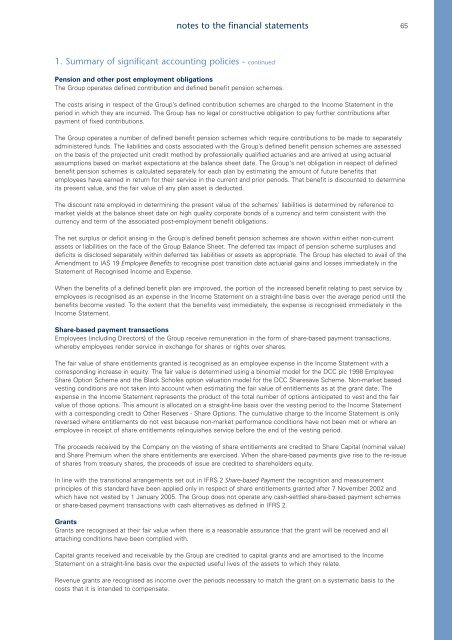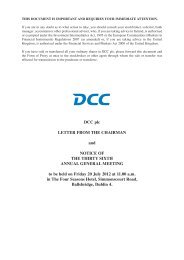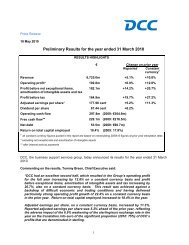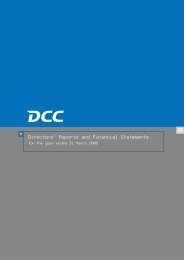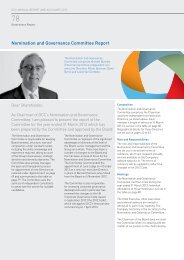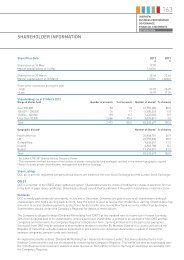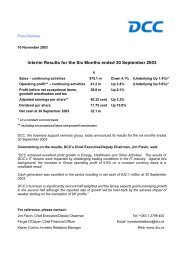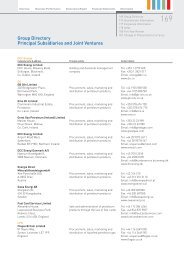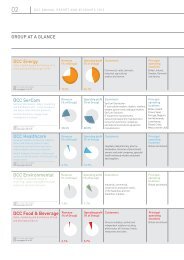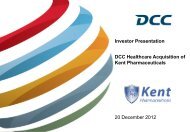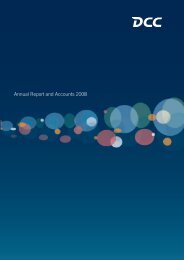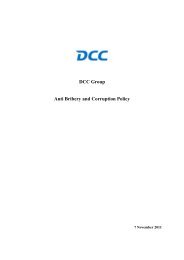Annual Report and Accounts 2006 - DCC plc
Annual Report and Accounts 2006 - DCC plc
Annual Report and Accounts 2006 - DCC plc
Create successful ePaper yourself
Turn your PDF publications into a flip-book with our unique Google optimized e-Paper software.
notes to the financial statements651. Summary of significant accounting policies - continuedPension <strong>and</strong> other post employment obligationsThe Group operates defined contribution <strong>and</strong> defined benefit pension schemes.The costs arising in respect of the Group’s defined contribution schemes are charged to the Income Statement in theperiod in which they are incurred. The Group has no legal or constructive obligation to pay further contributions afterpayment of fixed contributions.The Group operates a number of defined benefit pension schemes which require contributions to be made to separatelyadministered funds. The liabilities <strong>and</strong> costs associated with the Group’s defined benefit pension schemes are assessedon the basis of the projected unit credit method by professionally qualified actuaries <strong>and</strong> are arrived at using actuarialassumptions based on market expectations at the balance sheet date. The Group's net obligation in respect of definedbenefit pension schemes is calculated separately for each plan by estimating the amount of future benefits thatemployees have earned in return for their service in the current <strong>and</strong> prior periods. That benefit is discounted to determineits present value, <strong>and</strong> the fair value of any plan asset is deducted.The discount rate employed in determining the present value of the schemes' liabilities is determined by reference tomarket yields at the balance sheet date on high quality corporate bonds of a currency <strong>and</strong> term consistent with thecurrency <strong>and</strong> term of the associated post-employment benefit obligations.The net surplus or deficit arising in the Group's defined benefit pension schemes are shown within either non-currentassets or liabilities on the face of the Group Balance Sheet. The deferred tax impact of pension scheme surpluses <strong>and</strong>deficits is disclosed separately within deferred tax liabilities or assets as appropriate. The Group has elected to avail of theAmendment to IAS 19 Employee Benefits to recognise post transition date actuarial gains <strong>and</strong> losses immediately in theStatement of Recognised Income <strong>and</strong> Expense.When the benefits of a defined benefit plan are improved, the portion of the increased benefit relating to past service byemployees is recognised as an expense in the Income Statement on a straight-line basis over the average period until thebenefits become vested. To the extent that the benefits vest immediately, the expense is recognised immediately in theIncome Statement.Share-based payment transactionsEmployees (including Directors) of the Group receive remuneration in the form of share-based payment transactions,whereby employees render service in exchange for shares or rights over shares.The fair value of share entitlements granted is recognised as an employee expense in the Income Statement with acorresponding increase in equity. The fair value is determined using a binomial model for the <strong>DCC</strong> <strong>plc</strong> 1998 EmployeeShare Option Scheme <strong>and</strong> the Black Scholes option valuation model for the <strong>DCC</strong> Sharesave Scheme. Non-market basedvesting conditions are not taken into account when estimating the fair value of entitlements as at the grant date. Theexpense in the Income Statement represents the product of the total number of options anticipated to vest <strong>and</strong> the fairvalue of those options. This amount is allocated on a straight-line basis over the vesting period to the Income Statementwith a corresponding credit to Other Reserves - Share Options. The cumulative charge to the Income Statement is onlyreversed where entitlements do not vest because non-market performance conditions have not been met or where anemployee in receipt of share entitlements relinquishes service before the end of the vesting period.The proceeds received by the Company on the vesting of share entitlements are credited to Share Capital (nominal value)<strong>and</strong> Share Premium when the share entitlements are exercised. When the share-based payments give rise to the re-issueof shares from treasury shares, the proceeds of issue are credited to shareholders equity.In line with the transitional arrangements set out in IFRS 2 Share-based Payment the recognition <strong>and</strong> measurementprinciples of this st<strong>and</strong>ard have been applied only in respect of share entitlements granted after 7 November 2002 <strong>and</strong>which have not vested by 1 January 2005. The Group does not operate any cash-settled share-based payment schemesor share-based payment transactions with cash alternatives as defined in IFRS 2.GrantsGrants are recognised at their fair value when there is a reasonable assurance that the grant will be received <strong>and</strong> allattaching conditions have been complied with.Capital grants received <strong>and</strong> receivable by the Group are credited to capital grants <strong>and</strong> are amortised to the IncomeStatement on a straight-line basis over the expected useful lives of the assets to which they relate.Revenue grants are recognised as income over the periods necessary to match the grant on a systematic basis to thecosts that it is intended to compensate.


